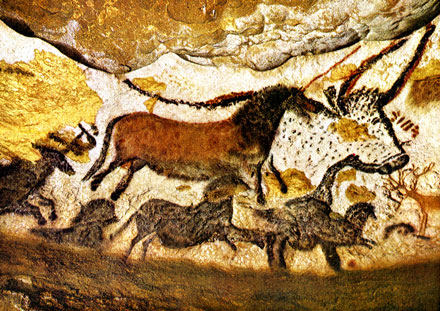
"I expect they [Homo sapiens idialtu] were much more like us than we have given them credit for being." -- Susan Antón, paleoanthropologist, June 2003
John Feliks: Phi in the Acheulian.
Phi in the Acheulian is the second of two papers presented at the XVth UISPP Congress in Lisbon (September 7, 2006) that offer a completely new perspective on the intelligence of our ancient ancestors. For the past 150 years, early humans have been regarded as inferior to us, unable to create art, think abstractly, or even to speak. In these two papers (Part I being The Graphics of Bilzingsleben), I demonstrate that this picture is not at all accurate and that early peoples such as Homo erectus, Homo ergaster, Neanderthals, and Homo heidelbergensis were just as intelligent as we are in today's modern world. The evidence provided in the two papers shows beyond any reasonable doubt that early people had highly-developed language and even mathematical ability 400,000 years ago.
OIM believes he is smart.
ReplyDeleteOIM = Caveman
Actually, the intelligence is the same between these two groups, it's just our intelligence has led us to take our adaptations for granted. These conveniences just leave us inclined to give our brains a break and quit using them, which has turned into a bad idea!
ReplyDeleteOIM,
ReplyDeleteRead this!
Archaeologists have found evidence of mass cannibalism at a 7,000-year-old human burial site in south-west Germany, the journal Antiquity reports.
The authors say their findings provide rare evidence of cannibalism in Europe's early Neolithic period.
Up to 500 human remains unearthed near the village of Herxheim may have been cannibalised.
The "intentionally mutilated" remains included children and even unborn babies, the researchers say.
The German site was first excavated in 1996 and then explored again between 2005 and 2008. More at:
http://news.bbc.co.uk/2/hi/science/nature/8394802.stm
KV,
ReplyDeleteModern Darwinists devolved from cannibals.
There are cannibals today in Africa and no one cares.
This comment has been removed by the author.
ReplyDeleteEven Roman public were known to become cannibals when they starved to death as the empire fell. We have very biased minds. We think only from a single point of view. The Puranic stories and Vedic concept says that as time passes, humans become increasingly filled with ego and bias. This is called the increase of Tamasic guna in the universe, time period -Kaliyuga. They would have the same intellegence but will fail to see a lot due to personal bias and ego. For example we hold the view that the ancients even 2000-5000 years back did not know of technology. Yoga, Aurveda, Vedic mathematics, astronomy, and ancient philosophy(Greek, Mesopotamian, Vedic, etc) makes me wanna believe something else, that maybe they had tried it all like us today coz such philosophy and natural sciences that we admire today, can be achieved only after a civilization has become very mature. And then maybe a large phase came which followed naturist living like today's naturists. Another eg. Recent Evidence of using zero was found in Mayan culture much before India. We would conclude that Mayans discovered it first based on proofs. Point to be seen is that we shoul now get grounded and think that since we have been wrong in many of our conclusions before, it would be wise to admit that we have very little knowledge as we go back in time, we can only follow trends and guess and actually many possibilities are possible.
ReplyDeleteWhat I mean is that the problem is that the scientific revolution of the last few centuries is based highly on proofs rather than on wisdom. Not just science, but our politics and justice systems too. While proofs are important we should not forget that proofs are constantly being doctored by natural processes and also world cultures.
Another example is, that we laugh when we read about mystic creatures when we read about them in something we call mythology. We tend to forget and compare our own findings and research about aliens and how early man looked like an ape, about mutations and that the history of humans probably goes back to a time we cant even imagine. Many cultures used to burn the dead and their posessions and houses were built on the base of ruins. There goes our evidence.
The possibilities are endless, we need to think like that and then delve into research. Research is like meditation, it opens doors to the unknown, just chuck out the bias.